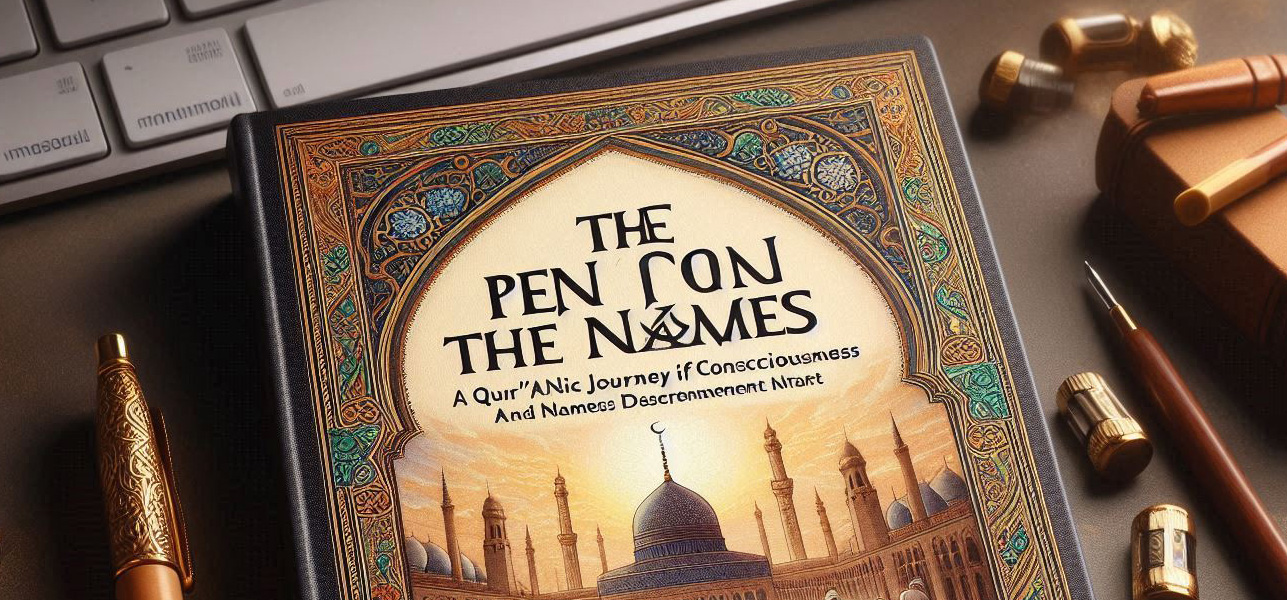The Pen and the Names: A Qur’anic Journey into Consciousness and Discernment
In the Qur’an, the pen (Al Qalam) is far more than a writing tool, it is a symbol of divine transmission, epistemic refinement, and the human journey from raw perception to conscious articulation. Across its verses, the pen emerges as a metaphor for the sacred act of distinguishing, recording, and remembering. But this journey begins not with ink, but with names.
The First Act of Teaching: Surah al-Baqarah 2:31
﴿وَعَلَّمَ آدَمَ ٱلۡأَسۡمَآءَ كُلَّهَا﴾
“And He taught Adam the names—all of them.”
This verse marks the origin of human consciousness in the Qur’anic narrative. The “names” here are not mere labels, but the divine impartation of discernment, the ability to distinguish between entities, concepts, and realities. According to classical tafsīr (e.g., Ibn Kathīr, al-Jalalayn), these names encompass animate and inanimate beings, material and immaterial realities. It is through this act that Adam is granted the capacity to perceive, categorize, and articulate the world, a foundational moment in the emergence of human cognition.
The Pen as a Symbol of Transmission and Refinement
The Qur’an later introduces the pen in Surah al-‘Alaq:
﴿ٱلَّذِي عَلَّمَ بِٱلۡقَلَمِ﴾ (96:4)
“Who taught by the pen.”
Here, the pen is the divine tool through which knowledge is preserved and propagated. It represents the transition from internal discernment to external expression, from knowing to sharing. The pen prunes ignorance, refines thought, and inscribes meaning into collective memory.
The Cosmic Oath: Surah al-Qalam 68:1
﴿نۚ وَٱلۡقَلَمِ وَمَا يَسۡطُرُونَ﴾
“Nun. By the pen and what they inscribe.”_
This oath elevates the pen to a cosmic witness. It is not just what is written, but how it is written, what is chosen, what is pruned, what is preserved. The pen here symbolizes the sacred responsibility of discernment and documentation, echoing the divine act of teaching Adam the names.
The Pen as Arbiter: Surah Āl ʿImrān 3:44
﴿يُلۡقُونَ أَقۡلَٰمَهُمۡ أَيُّهُمۡ يَكۡفُلُ مَرۡيَمَ﴾
“They cast their pens to decide who would care for Mary.”
In this verse, pens become instruments of moral arbitration. What was once a tool of writing becomes a medium of divine selection, suggesting that epistemic tools, when surrendered to divine will, can serve justice and purity.
The Infinite Words: Surah Luqmān 31:27
﴿وَلَوۡ أَنَّمَا فِي ٱلۡأَرۡضِ مِن شَجَرَةٍ أَقۡلَٰمٞ وَٱلۡبَحۡرُ يَمُدُّهُۥ… مَّا نَفِدَتۡ كَلِمَٰتُ ٱللَّهِ﴾
Even if all earthly trees were pens and the seas ink, the words of God would not be exhausted. This verse humbles the pen before divine infinitude. It reminds us that all human discernment, no matter how vast, remains finite before the boundless wisdom of the Divine.
Closing Reflection
From the teaching of names to the casting of pens, the Qur’an traces a profound arc: the awakening of human consciousness, the refinement of thought, and the sacred duty to inscribe truth. The pen is not merely a tool, it is a trust. And the names are not merely words, they are windows into meaning.
